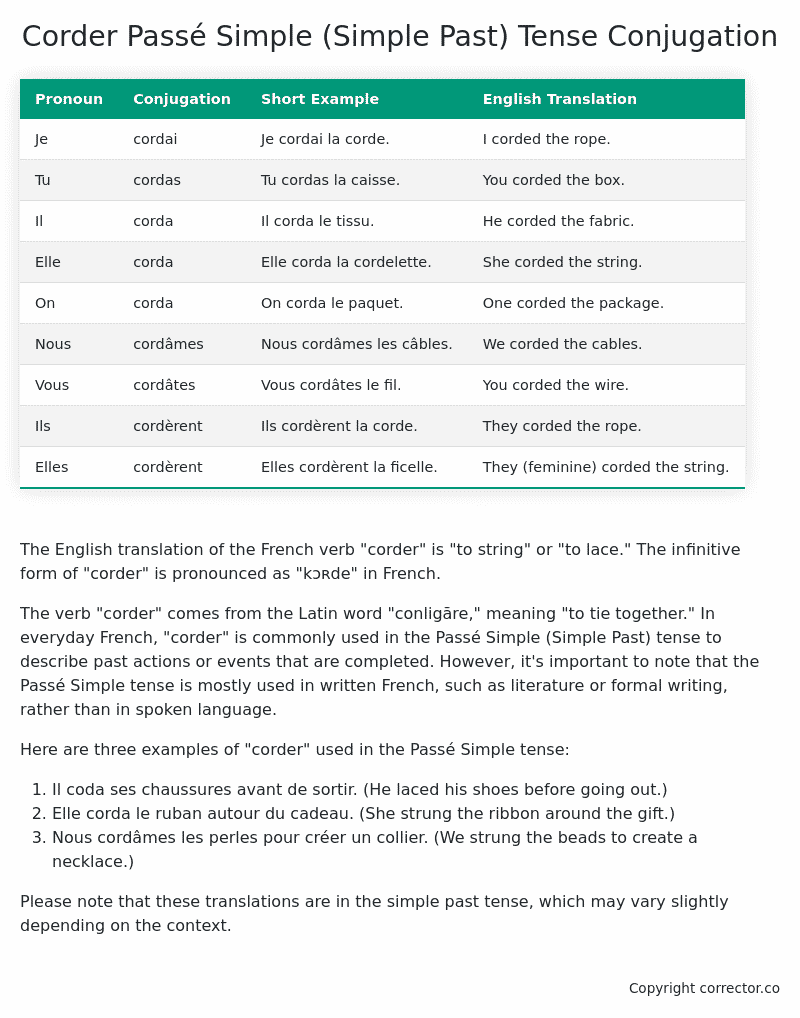Passé Simple (Simple Past) Tense Conjugation of the French Verb corder
Introduction to the verb corder
The English translation of the French verb “corder” is “to string” or “to lace.” The infinitive form of “corder” is pronounced as “kɔʀde” in French.
The verb “corder” comes from the Latin word “conligāre,” meaning “to tie together.” In everyday French, “corder” is commonly used in the Passé Simple (Simple Past) tense to describe past actions or events that are completed. However, it’s important to note that the Passé Simple tense is mostly used in written French, such as literature or formal writing, rather than in spoken language.
Here are three examples of “corder” used in the Passé Simple tense:
- Il coda ses chaussures avant de sortir. (He laced his shoes before going out.)
- Elle corda le ruban autour du cadeau. (She strung the ribbon around the gift.)
- Nous cordâmes les perles pour créer un collier. (We strung the beads to create a necklace.)
Please note that these translations are in the simple past tense, which may vary slightly depending on the context.
Table of the Passé Simple (Simple Past) Tense Conjugation of corder
| Pronoun | Conjugation | Short Example | English Translation |
|---|---|---|---|
| Je | cordai | Je cordai la corde. | I corded the rope. |
| Tu | cordas | Tu cordas la caisse. | You corded the box. |
| Il | corda | Il corda le tissu. | He corded the fabric. |
| Elle | corda | Elle corda la cordelette. | She corded the string. |
| On | corda | On corda le paquet. | One corded the package. |
| Nous | cordâmes | Nous cordâmes les câbles. | We corded the cables. |
| Vous | cordâtes | Vous cordâtes le fil. | You corded the wire. |
| Ils | cordèrent | Ils cordèrent la corde. | They corded the rope. |
| Elles | cordèrent | Elles cordèrent la ficelle. | They (feminine) corded the string. |
Other Conjugations for Corder.
Le Present (Present Tense) Conjugation of the French Verb corder
Imparfait (Imperfect) Tense Conjugation of the French Verb corder
Passé Simple (Simple Past) Tense Conjugation of the French Verb corder (You’re reading it right now!)
Passé Composé (Present Perfect) Tense Conjugation of the French Verb corder
Futur Simple (Simple Future) Tense Conjugation of the French Verb corder
Futur Proche (Near Future) Tense Conjugation of the French Verb corder
Plus-que-parfait (Pluperfect) Tense Conjugation of the French Verb corder
Passé Antérieur (Past Anterior) Tense Conjugation of the French Verb corder
Futur Antérieur (Future Anterior) Tense Conjugation of the French Verb corder
Subjonctif Présent (Subjunctive Present) Tense Conjugation of the French Verb corder
Subjonctif Passé (Subjunctive Past) Tense Conjugation of the French Verb corder
Subjonctif Imparfait (Subjunctive Imperfect) Tense Conjugation of the French Verb corder
Subjonctif Plus-que-parfait (Subjunctive Pluperfect) Tense Conjugation of the French Verb corder
Conditionnel Présent (Conditional Present) Tense Conjugation of the French Verb corder
Conditionnel Passé (Conditional Past) Tense Conjugation of the French Verb corder
Conditionnel Passé II (Conditional Past II) Tense Conjugation of the French Verb corder
L’impératif Présent (Imperative Present) Tense Conjugation of the French Verb corder
L’impératif Passé (Imperative Past) Tense Conjugation of the French Verb corder
L’infinitif Présent (Infinitive Present) Tense Conjugation of the French Verb corder
L’infinitif Passé (Infinitive Past) Tense Conjugation of the French Verb corder
Le Participe Présent (Present Participle) Tense Conjugation of the French Verb corder
Le Participe Passé (Past Participle) Tense Conjugation of the French Verb corder
Struggling with French verbs or the language in general? Why not use our free French Grammar Checker – no registration required!
Get a FREE Download Study Sheet of this Conjugation 🔥
Simply right click the image below, click “save image” and get your free reference for the corder Passé Simple tense conjugation!

Corder – About the French Passé Simple (Simple Past) Tense
Formation
Usage
Narration
Historical Context
Interactions with other tenses
Passé Composé
Imparfait
Conditional and Subjunctive
Summary
I hope you enjoyed this article on the verb corder. Still in a learning mood? Check out another TOTALLY random French verb conjugation!


